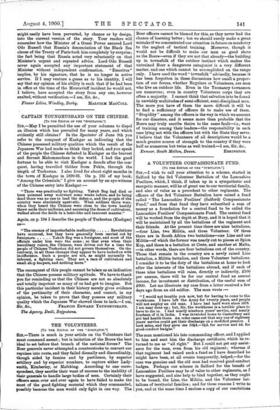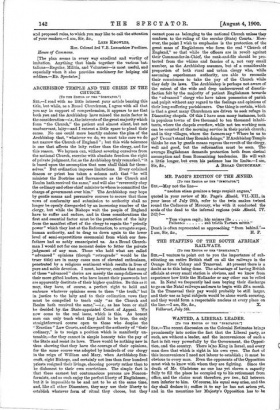A VOLUNTEER COMPASSIONATE FUND.
[To THE EDITOR OF THE "SPECTATOR.")
Stn,—I wish to call your attention to a scheme, started in Salford by the 3rd Volunteer Battalion of the Lancashire Fusiliers, which, I think, if taken up in a sympathetic and energetic manner, will be of great use to our territorial family, and also of value as a precedent to other regiments. The officers of the 3rd Volunteer Battalion have raised a fund called "The Lancashire Fusiliers' (Salford) Compassionate Fund," and from that fund they have subscribed a sum of money as a foundation for a central fund to be called the Lancashire Fusiliers' Compassionate Fund. The central fund will be worked from the depot at Bury, and it is hoped that it will be maintained by all the battalions of the regiment and their friends. At the present time there are nine battalions, —four Line, two Militia, and three Volunteer. Of these there are in South Africa two battalions—one Line and one Militia—of which the former was nearly cut to pieces at Spion Kop, and there is a battalion at Crete, and another at Malta, —in other words, there are four battalions out of the country.
Those that remain in the country are a newly raised Line battalion, a Militia battalion, and three Volunteer battalions. I consider it to be the duty of the battalions at home to look after the interests of the battalions abroad, and if each of these nine battalions will raise, directly or indirectly, 2100 per annum, there will be for our central fund an annual income, for investment or distribution, of the useful sum of 2900. Let me illustrate my case from a letter received a few days ago from an old soldier. The man wrote :—
"I would not trouble you now, but for having to come to the workhouse. I have left the Army for twenty years, and people will not employ an old man. I have had hard work since 18Th. I am near done up ; but, Sir, the workhouse is a terrible place to have to die in. I had nearly nineteen years' service, and nearly fourteen of it in India. I was invalided home to Canterbury and got bad health there. An order came out that any one of eighteen years' service could get their discharge on a modified pension. I took mine, and they gave me 101}d.— 6i d. for service and 4d. for good-conduct badges.'
The man mentioned his late commanding officer, and I applied to him and sent him the discharge certificate, which he re- turned to me as "all right." But I could not get any aasist- ance for the man, even from his old regiment; whereas if that regiment had raised such a fund as I have described he might have been, at all events temporarily, helped,—for the case was genuine and the old man had received good-conduct badges. Perhaps our scheme in Salford for the benefit of
Lancashire Fusiliers may be of value to other regiments, as I have suggested, and also help to bind together, as they ought to be bound, the Line, the Militia, and the Volunteer bat- talions of territorial families ; and for these reasons I write to you, and at the same time I enclose a copy of our resolutions aid proposed rules, to which you may like to call the attention of your readers.—I am, Sir, &c.,
LEES KNOWLES,
[The plan seems in every way excellent and worthy of imitation. Anything that binds together the various bat- ta]ions—Regular, Militia, and Volunteer—is most useful, and especially when it also provides machinery for helping old soldiers.—En. Spectator.]



































 Previous page
Previous page